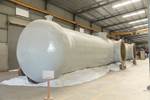ExxonMobil announces licensing agreement to expand GFRP rebar processing tech
ExxonMobil acquires exclusive overseas licensing rights for Neuvokas’ proprietary manufacturing process, expanding to global markets.
GFRP Gatorbar. Source | Neuvokas Corp.
ExxonMobil (Houston, Texas, U.S.) has announced a strategic licensing agreement with (Ahmeek, Mich., U.S.), producer of GatorBar glass fiber-reinforced polymer (GFRP) composite rebar. Under this agreement, ExxonMobil has obtained exclusive rights to sublicense Neuvokas’ proprietary manufacturing process in markets outside of North America (read 2023’s “Gatorbar, NEG, ExxonMobil join forces for composite rebar”). According to ExxonMobil, this collaboration marks a step toward expanding the global market of composite rebar within the concrete reinforcement sector.
ExxonMobil’s Proxxima system’s ultra-low viscosity and snap cure technology, paired with Neuvokas’ innovative process, is reported to enable production speeds up to 20 times faster than traditional composite rebar methods. This process efficiency ultimately builds up GatorBar’s cost-competitiveness to traditional steel rebar.
GatorBar inherently results in corrosion-free, lightweight, long-lasting GFRP rebar while its new Grip technology eliminates slivers common to GFRP competitors. These features further differentiate GatorBar versus traditional steel by delivering reduced transportation costs, simplified handling, faster installation, potential for design optimizations and value across a broad range of projects.
The collaboration highlights both companies’ dedication to driving technology innovation and proving cost-effective solutions for the construction industry.
Related Content
-
Fiber Elements raises €2.6 million seed funding for 3D basalt fiber
The company’s approach combines FEA with advanced manufacturing processes to create mineral composites that are 3X stronger than steel while weighing two-thirds less, aiming to replace steel reinforcement in construction.
-
GFRP Tech launches EnviraBar rebar
GFRP rebar product range is produced in South Africa, offering an alternative solution to steel rebar.
-
Rock Fiber Inc., ReforceTech form ReforceTech Americas
Joint venture entity will drive the availability and applicability of fiber reinforcement in construction to clients worldwide.



